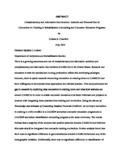Complementary and alternative interventions : attitudes and use of counselors-in-training in counselor education programs
Author
Crawford, Celeste S.
Abstract
There is a growing awareness and use of complementary and alternative medicine and complementary and alternative interventions (CAM/CAI) in the United States. Research and education in both the medical and nursing professions reflect this developing paradigm; however, there is sparse research concerning counselors-in-training views on CAM/CAI and their willingness to incorporate these approaches into clinical practice. This study addressed the gap in research by exploring what counselors-in-training know and what their attitudes are toward CAM/CAI in order to enable counselor educators to be better informed and prepared to proceed with integrating these practices into training and curriculum. Using the Survey of Knowledge and Attitudes of Counseling Students Towards CAM/CAI, we surveyed counselors-in-training (n = 93) enrolled in a CACREP accredited counselor education program and a CACREP accredited rehabilitation counseling program at the same university. The results indicate that a majority of the students had positive attitudes towards CAM/CAI and believed this topic should be integrated into counselor training curriculum. Further analysis found that there was no significant difference in general attitudes towards CAM/CAI between any of the demographic variables. Additionally, there was no significant difference in classification ofCAM/CAI modalities as mainstream or alternative and any of the demographic variables. Finally, the results of this study show there was a significant relationship between personal use of CAM/CAI and willingness to incorporate CAM/CAI modalities into future clinical practice. Limitations of the study include a lack of a control group, a relatively small sample size, and the need for more valid and reliable instrumentation. The study concludes with implications for the counseling profession, counselor education, and future research.
Date
1/13/16
Citation:
APA:
Crawford, Celeste S..
(January 0001).
Complementary and alternative interventions : attitudes and use of counselors-in-training in counselor education programs
(Doctoral Dissertation, East Carolina University). Retrieved from the Scholarship.
(http://hdl.handle.net/10342/5085.)
MLA:
Crawford, Celeste S..
Complementary and alternative interventions : attitudes and use of counselors-in-training in counselor education programs.
Doctoral Dissertation. East Carolina University,
January 0001. The Scholarship.
http://hdl.handle.net/10342/5085.
May 05, 2024.
Chicago:
Crawford, Celeste S.,
“Complementary and alternative interventions : attitudes and use of counselors-in-training in counselor education programs”
(Doctoral Dissertation., East Carolina University,
January 0001).
AMA:
Crawford, Celeste S..
Complementary and alternative interventions : attitudes and use of counselors-in-training in counselor education programs
[Doctoral Dissertation]. Greenville, NC: East Carolina University;
January 0001.
Collections
Publisher
East Carolina University

